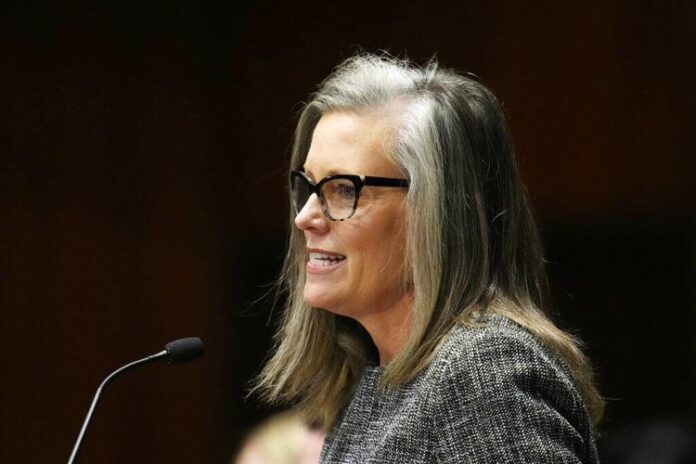
Arizona Gov. Katie Hobbs asked social media platforms to limit accounts criticizing posts she made during her tenure as Secretary of State.
The requests came to light in emails obtained by Arizona Capitol Oversight, a new initiative to increase transparency and accountability in government through public records.
The group referenced a preliminary injunction made by a federal judge on July 4 saying that the federal government may have violated the First Amendment by asking platforms to “censor unfavorable views” when explaining the release of the emails from Hobbs and her state, which are government public record.
While most of the emails in the report were from her staff at the time, Hobbs once directly emailed Twitter support in 2020 over a post she made in 2017 about supporters of former President Donald Trump.
“.@realDonaldTrump has made it abundantly clear he’s more interested in pandering to his neo-nazi base than being @POTUS for all Americans,” she tweeted on August 15, 2017.
On November 13, 2020, just days after Trump lost re-election, Hobbs emailed the platform and asked for assistance to the backlash. Arizona officials were under intense scrutiny due to Trump’s narrow loss in the state, leading many to falsely accuse elected officials of intentionally rigging the race against him.
“I am not sure I can provide the information you are asking for because I reported and then blocked multiple users at the same time,” she said. “The alt-right got a hold of a 3-year-old tweet on my account and have been sending harassing, abusive, and threatening tweets and direct messages for the last two days.”
However, the report notes that even though Hobbs used her government email address, the post was from her campaign account.
The Democrat’s staff also asked Facebook to take down a post made by Republican Kelly Townsend, a state representative and senator-elect at the time for “election-related misinformation.”
Townsend’s November 12, 2020, post did contain unsubstantiated claims regarding the presidential election, but it was not taken down by the platform. Instead, it has a tag at the bottom that states, “Both voting by mail and voting in person have a long history for trustworthiness in the U.S. Voter fraud is extremely rare across voting methods” and references the Bipartisan Policy Center as a source. Townsend’s post specifically references the aforementioned tweet Hobbs made about Trump:
“A three-year-old tweet, not isolated as the only example, of the now Arizona Secretary of State’s Twitter account cast Trump supporters as Neo-Nazis. This partisan rhetoric eroded any hope that the Secretary of State could approach Arizona’s elections in a non-partisan, non-biased manner,” the Republican wrote.
In addition, the report also mentions how the Secretary of State’s office under Hobbs also attempted to work with the Center for Internet Security in hopes of getting posts from the Arizona Republican Party taken down in the contentious period following the 2020 election.
The group argues that while many posts made about the election were concerning, it was problematic for a government office to ask for censorship as a matter of principle.
“These emails leave no doubt that Katie Hobbs abused her position of power in government,” said Brian Anderson, president of Arizona Capitol Oversight and previously a staffer for former Gov. Doug Ducey. “She violated the First Amendment rights of people across Arizona in order to suppress valid criticism and prop up her 2022 gubernatorial campaign. It’s imperative that further investigations be initiated to shine a light on just how far Hobbs’s unconstitutional censorship campaign went — and whether it continues today.”
Hobbs’ office did not respond to a request for comment in time for publication.
Republished with the permission of The Center Square.













